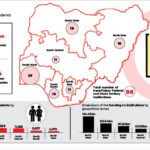Reno Omokri, an erstwhile aide to former President Goodluck Jonathan, has made a series of claims on Nigeria’s economy, saying in 2015, a bag of rice sold for N8,000 but is now selling for N42,000.
While some of the claims he made via his Twitter handle @renoomokri, are true, Daily Trust Checks found others to be false.
- Fact CHECK: Did Elon Musk say he would buy Nigeria, Facebook?
- FACT CHECK: Does next week have longest ‘weekend’ as claimed?
In a series of tweets on Tuesday, Omokri said, “This was Nigeria in 2015: Fuel was N87, it is now N170. Bag of rice was N8k (N8,000), now it is 42k (N42000). Dollar was N199, it is now N580. Coke was N60, it is now N180.
He added that “Bandits did not even exist under Jonathan. Today they possess surface to air missiles. Before you could travel from Kaduna to Abuja by road, it is now a death sentence.
“Nigeria owed N12 trillion, we now owe N44 trillion. There were no unknown gunmen, today UGM is a reality.
“Tomato paste was N40. It is now N180. NEVER FORGET!”
It is true that in 2015, fuel was N87 but now sells for N170. In May 2016, it increased to N145 per lire representing a 66 per cent increase. In 2020, it was further reviewed upwards to N162 per litre. In 2020, the product increased and started selling between N165 per litre and N200 per litre at the various filling stations in the country.
Filling stations in major cities of Lagos, Abuja, Port Harcourt and Kano sell the product at N65 per litre. However, other states of the federation sell the product between N170 and N200 per litre.
However Omokri’s claim that a bag of rice which used to be N8,000 now sells for N42,000 is false.
In 2015, a bag of rice mostly Royal Stallion and other imported rice sold between N8,000 and N10,000. However, the price of rice began to increase at the peak of Covid-19 pandemic which was aggravated by the federal government pronouncement of border closure.
A survey of prices of rice by this reporter at Utako and Nyanya market of the FCT showed that locally produced rice ranges from N25,000 to N30,000 while foreign rice is between N30,000 to N35,000.
Fruthermore, Omokri’s claim that a dollar was N199, but now exchanges for N580 is true. A breakdown of naira devaluation by Daily Trust shows that in 2015 when President Buhari assumed office, the dollar was exchanging for naira at N198 at the parallel market, by 2018 it was N306 to dollar.
By 2019 it went up to N360 to dollar and eventually got to N520 in 2021. From 2021 till date, a dollar at the parallel market is exchanging between N560 to N600.
In another claim, the former presidential aide said Nigeria owed N12 trillion as of 2015, but the debt now stands at N44 trillion.
However, checks by Daily Trust proved that the claim isn’t entirely true. As of the first quarter of 2015, Nigeria’s debt stock stood at N12.06 trillion, agreeing to part of Omokri’s assertion. The figure has now moved to over N39 trillion, showing a 215 per cent increase over 7 years.
Data from the Debt Management Office has shown that Nigeria’s total public debt rose by 20.2 per cent to N39.56 trillion ($95.77 billion) as of December 31, 2021, up from N32.92 trillion ($86.392 billion) in 2020, the Director-General of the DMO, Ms. Patience Oniha, had stated.
DMO said that the figure also included the N5.489 trillion new borrowings by the federal government as contained in the 2021 Appropriation and Supplementary Acts to part-finance Deficit.
Therefore, going by the DMO data, Nigeria’s current debt profile stands at N39.56 trillion. As such the claim by Mr. Omokri that the current debt profile of the country has reached N44 trillion is false.
That Tomato paste which used to be N40 is now N180 also stands truth on its head, though the cost of staple food items increased in March 2022, according to the latest figures from the National Bureau of Statistics (NBS).
The NBS reported in its Selected Food Watch Price for March 2022 that the price of the most food items increased on a year-on-year and month-on-month basis. However, a market survey of the price of tomato paste shows that it has increased in the past years by 200 per cent from an average N50 to between N100 and N150.
This fact check was done in partnership with the Centre for Democracy and Development (CDD).

 Join Daily Trust WhatsApp Community For Quick Access To News and Happenings Around You.
Join Daily Trust WhatsApp Community For Quick Access To News and Happenings Around You.


